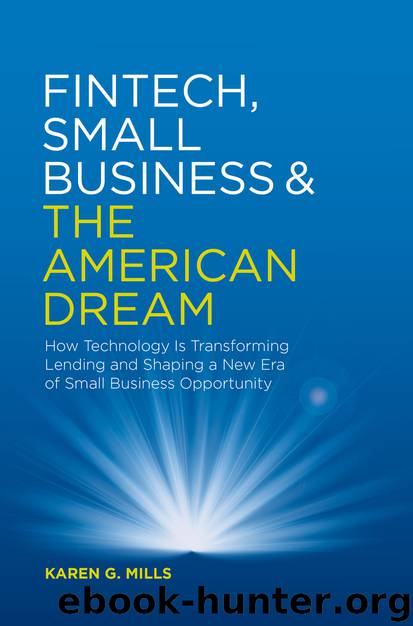Fintech, Small Business & the American Dream by Karen G Mills

Author:Karen G Mills
Language: eng
Format: epub
ISBN: 9783030036201
Publisher: Springer International Publishing
The story of Tala Mobile is not an isolated example. Many traditional and new lenders, from large banks to platform players like Amazon and Google, have large amounts of data that can be used to generate information about what kind of loan a small business needs and when, as well as what the business can do to increase its sales and otherwise improve its financial situation.
The potential uses of big data, predictive algorithms, and other kinds of artificial intelligence are both exciting and scary. As with all advances, there is a lot of potential downside in the future world we have imagined for small businesses and their lenders. One significant risk is the possibility of unintended consequences, or even potential misuse of data, as a result of algorithm-driven decision-making.
Imagine a car insurance company that sifted through its customer data and identified a single factor that consistently correlated with a 30 percent increase in car accidents. Now imagine that the factor was whether the driver of the car bought frozen pizza. This example may seem absurd, since there is no obvious causal link between frozen pizza-buying behavior and auto accidents, but it is based on a true story. The real insurance company in the example decided not to use the data to determine their insurance premiums for two reasons. First, if people found out that buying frozen pizza would hike their premiums, they would stop buying it without changing the other risk factors that actually caused accidents. Second, the company felt that its use of the information, if known, would likely provoke a public backlash.
But what if the insurance company had made the opposite decision or a small business lender used similar data to determine loan approvals and pricing? What recourse would the small business owner have if they were suddenly refused credit? Would the business have the right to a transparent review of the data used to make the decision? Who controls the algorithm?
These questions are pertinent as we think about the next phase of innovation in financial technology. In the United Kingdom, regulators have implemented an Open Banking regime, which facilitates data sharing across financial entities and in which small businesses and consumers own their financial data.2 Their experience will begin to test important questions, such as who can use data and how, and perhaps, most importantly, what happens when lenders increasingly move from pre-programmed algorithms to machine learning.
Download
This site does not store any files on its server. We only index and link to content provided by other sites. Please contact the content providers to delete copyright contents if any and email us, we'll remove relevant links or contents immediately.
Hit Refresh by Satya Nadella(9134)
The Compound Effect by Darren Hardy(8967)
Change Your Questions, Change Your Life by Marilee Adams(7781)
Nudge - Improving Decisions about Health, Wealth, and Happiness by Thaler Sunstein(7706)
The Black Swan by Nassim Nicholas Taleb(7129)
Deep Work by Cal Newport(7083)
Rich Dad Poor Dad by Robert T. Kiyosaki(6632)
Daring Greatly by Brene Brown(6513)
Principles: Life and Work by Ray Dalio(6447)
Playing to Win_ How Strategy Really Works by A.G. Lafley & Roger L. Martin(6305)
Man-made Catastrophes and Risk Information Concealment by Dmitry Chernov & Didier Sornette(6019)
Big Magic: Creative Living Beyond Fear by Elizabeth Gilbert(5771)
Digital Minimalism by Cal Newport;(5764)
The Myth of the Strong Leader by Archie Brown(5507)
The Slight Edge by Jeff Olson(5417)
Discipline Equals Freedom by Jocko Willink(5389)
The Motivation Myth by Jeff Haden(5212)
The Laws of Human Nature by Robert Greene(5208)
Stone's Rules by Roger Stone(5088)
